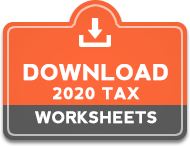
Tax Changes Canadians Need to Know About for 2020
January 3, 2020
Your Shareholder Loan and the CRA
January 23, 20202020 Tax Due Dates for Canadians
A new year is here and as diligent accountants (read: nerds), we’re already planning for 2020. To get the ball rolling, we’re going to list out the most common tax deadlines that Canadian tax payers will encounter this year. We will look at:
-
Personal Tax Deadlines in 2020
-
Corporate Tax Deadlines in 2020, and
-
GST / HST Deadlines in 2020
Personal Tax Deadlines 2020
SELF-EMPLOYED
If you or your spouse earned business income in 2019 then your tax return is due Monday June 15, 2020.
This deadline is a bit tricky because taxes owing are still due April 30, 2020 even though the actual filing of the return is not due until June.
NOT SELF-EMPLOYED
If you and your spouse do not earn self-employment income, then your tax return and taxes owing are both due April 30, 2020. This is the most common scenario for tax payers.
TAX INSTALLMENTS
If you are required to pay tax installments in 2020, they are due:
-
March 15th
-
June 15th
-
September 15th
-
December 15th
RRSP CONTRIBUTION DEADLINE
You can contribute to your RRSP until Monday, March 2, 2020 and still have it reduce your 2019 taxes owing.
Corporate Tax Deadlines
Corporate tax deadlines are a little different than personal tax deadlines. For tax purposes, corporations can have year-ends that are not December 31st. However, we can still easily figure out when your corporate tax returns and amounts owing are due.
CORPORATE TAX RETURNS
Corporate tax return filings are due 6 months after the year-end. Let’s clarify a couple of scenarios:
-
When the corporation’s tax year end is on the last day of a month, the return is due by the last day of the 6th month after the year-end. For example, a December 31, 2019 year end would have a June 30, 2020 due date.
-
When the last day of the tax year is not the last day of a month, the return is due the same day of the 6th month after the year-end. For example, a September 15, 2019 year end would have a March 15, 2020 year end.
CORPORATE TAXES OWING
The due dates for balances owing are earlier than the due dates for actually filing the tax returns. The short version is that taxes owing are due 2 months after the year-end.
However, there is an exception that is very common. Corporate taxes are due 3 months after the year-end if the following criteria apply:
-
The corporation is a Canadian Controlled Private Corporation.
-
The corporation claimed the small business deduction for the current or previous year.
-
The corporation and all associated corporations (if applicable) had taxable income less than $500,000 in the previous year.
The exception noted above is very common, so there is a good chance your corporate taxes are due 3 months after the year-end. Because it’s a bit trickier, we recommend asking your accountant or sending us a message to make sure you’ve got the right date.
GST / HST Deadlines
There are a few common scenarios for GST return due dates.
MONTHLY FILERS
When GST returns are filed monthly, the return and amounts owing are due 1 month after the end of the reporting period. For example, a June 1-30 filing period means the return is due July 31st.
QUARTERLY FILERS
When GST returns are filed quarterly, the return and amounts owing are due 1 month after the end of the reporting period. For example, a July 1 – September 30 filing period means the return is due October 31st.
ANNUAL FILERS (EXCEPT INDIVIDUALS WITH DECEMBER 31 YEAR-ENDS)
When GST returns are filed annually by a business that is not an individual, the return and amounts owing are due 3 months after the reporting period end date. For example, a July 1, 2018 – June 30, 2019 filing period means the return is due September 30, 2019.
ANNUAL FILERS (INDIVIDUALS WITH DECEMBER 31 YEAR-ENDS)
Individuals who file GST annually and have December 31 as their fiscal and tax year-ends have slightly different due dates. They mirror the tax due dates for self-employed individuals. Due dates in 2019 look like this:
-
GST owing is due April 30, 2020
-
Filing of the GST returns is due June 15, 2020
If you have any questions or need clarification about when something is due, reach out to Paul here. We truly enjoy helping and we take pride in being organized and making sure that we don’t miss deadlines!
Written by: Paul
Article Resource: avalonaccounting.ca







